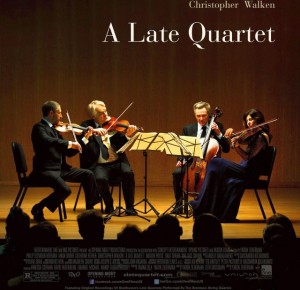Interview: Composer Angelo Badalamenti of “A Late Quartet”
Posted on November 12, 2012 at 3:59 pm
 Composer Angelo Badalamenti, who describes his music as bringing “beautiful sadness” to film, was kind enough to answer my questions about his work on “A Late Quartet,” the story of a classical string quartet starring Christopher Walken, Philip Seymour Hoffman, and Catherine Keener.
Composer Angelo Badalamenti, who describes his music as bringing “beautiful sadness” to film, was kind enough to answer my questions about his work on “A Late Quartet,” the story of a classical string quartet starring Christopher Walken, Philip Seymour Hoffman, and Catherine Keener.
What are the special challenges of writing a score for a movie about music and musicians?
“A Late Quartet” was certainly a challenging opportunity as a composer. It’s a film about music and musicians, so we had classical music and on-screen performances to consider. Given that, the score needed to serve the drama in key moments, without clashing with the pre-existing music. You have to know where you’re coming from and where you’re going. It’s a challenge that I enjoy.
How does the score work with or contrast with the quartet’s performance pieces featured in the film?
The orchestra we recorded for the score is still quite classical so it doesn’t take you out of the mood of the film. We hear a chamber string ensemble with a woodwind quintet; and harp, classical guitar, etc.. The strings are like a blown-up string quartet with a more diffuse sound and the winds represent the souls of the characters. I also tried to incorporate some motifs that were inspired by the Opus 131. So, the score keeps us grounded within the world of music that the quartet members inhabit.
Does it make a difference in working on a film when the director, Yaron Zilberman, is also the writer?
It’s actually quite helpful. The insight that a writer has is special, and this understanding can be very productive in working with a composer. When we sit together and discuss where to place music (we call this “spotting”) the director may have very specific notes to give.
When you first met to talk about this film, what did you discuss about the mood and the goals for the score?
Yaron and I agreed that the score should emote passion and pain. The characters are beset with a series of hardships which are all very personal. We needed to feel this.
Of the directors and performers you’ve worked with, which one taught you the most?
David Lynch is a creative genius and a dear friend. I’ve learned more from him than any other single person in film, tv, or music. But it’s a great mutual relationship.
How have movie scores changed since you began working on them?
There’s less melody these days. I still write music with a beautiful sadness, and with a memorable theme at its heart. I think that’s a timeless approach.
What movie scores from the movies of the 40’s and 50’s do the best job of telling the story?
Laura is a fantastic score with a single, outstanding theme. Brilliant.

One Reply to “Interview: Composer Angelo Badalamenti of “A Late Quartet””
Comments are closed.